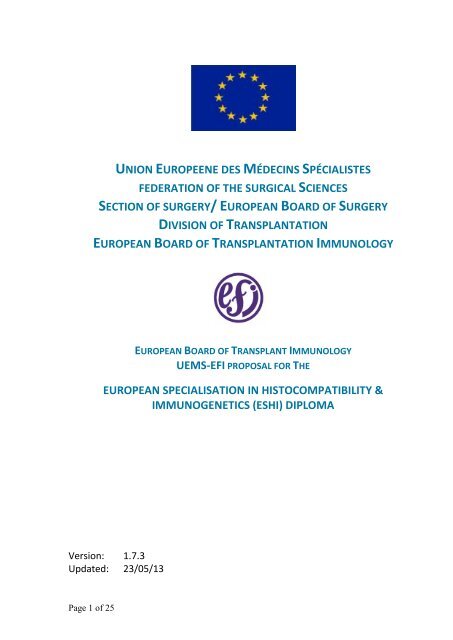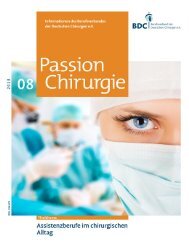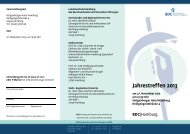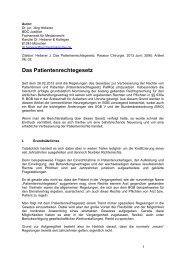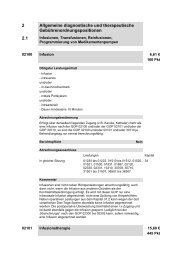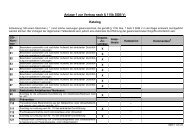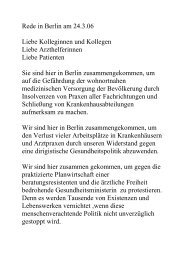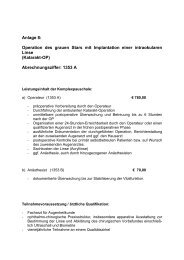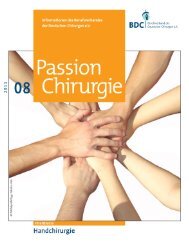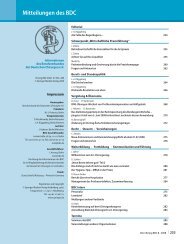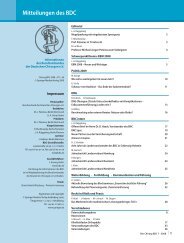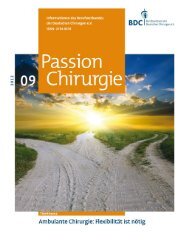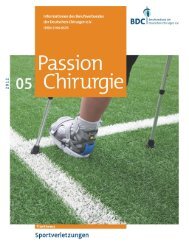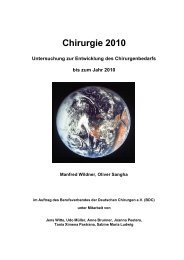(eshi) diploma - BDC
(eshi) diploma - BDC
(eshi) diploma - BDC
Create successful ePaper yourself
Turn your PDF publications into a flip-book with our unique Google optimized e-Paper software.
UNION EUROPEENE DES MÉDECINS SPÉCIALISTES<br />
FEDERATION OF THE SURGICAL SCIENCES<br />
SECTION OF SURGERY/ EUROPEAN BOARD OF SURGERY<br />
DIVISION OF TRANSPLANTATION<br />
EUROPEAN BOARD OF TRANSPLANTATION IMMUNOLOGY<br />
EUROPEAN BOARD OF TRANSPLANT IMMUNOLOGY<br />
UEMS-EFI PROPOSAL FOR THE<br />
EUROPEAN SPECIALISATION IN HISTOCOMPATIBILITY &<br />
IMMUNOGENETICS (ESHI) DIPLOMA<br />
Version: 1.7.3<br />
Updated: 23/05/13<br />
Page 1 of 25
1. Introduction<br />
The Education Committee of the European Federation for Immunogenetics (EFI) has been<br />
active for a number of years. A recent aim of the group was to establish a Europe wide<br />
mechanism for recognition of high level training and competency in the field of<br />
Histocompatibility and Immunogenetics (H&I). As such, a proposal was formulated to the<br />
European Union of Medical Specialists (UEMS) to create the European Board of Transplant<br />
Immunology (EBTI) within the Division of Transplantation of the UEMS. This body will<br />
promote the highest standards of training for transplant immunologists working in the field<br />
of H&I. The EBTI will operate as part of the Division of Transplantation under the UEMS<br />
Section of Surgery and the European Board of Surgery (EBS). The EBTI will operate in close<br />
collaboration with EFI and is a not-for-profit organisation.<br />
Training towards the European Specialisation in Histocompatibility & Immunogenetics (ESHI)<br />
qualification is an in-service training plan for medically or scientifically qualified individuals<br />
working in H&I laboratories. It is aimed at Directors/Co-Directors/Heads of laboratories and<br />
those who wish to progress to this level.<br />
The aim is to ensure a solid training in the skills necessary to undertake the work of a<br />
Director/Co-Director of a clinical H&I laboratory. Applicants will be assessed for eligibility<br />
following a period of training and will sit an oral examination. Upon successful completion of<br />
the examination the individual will be recognised as being able to form a clinically relevant<br />
opinion in H&I related issues based upon an applied, contemporary, scientific<br />
understanding. This informed opinion will underpin their ability to give clinically relevant<br />
advice in all aspects of H&I.<br />
Training should take place in clinical H&I laboratories supporting organ and haematopoietic<br />
stem cell transplantation programmes and blood transfusion services. Practical experience<br />
at the bench and experience in clinical liaison must be gained in all major aspects of clinical<br />
H&I. Obviously, it may be necessary to receive training in laboratories other than that in<br />
which the candidate is employed to receive sufficient breadth of clinical experience. The<br />
trainee must show evidence that they have accumulated the advanced clinical, technical,<br />
scientific and managerial skills required to direct a diagnostic H&I laboratory.<br />
To undertake i) the training, ii) the application for eligibility and iii) the examination the<br />
trainee must:<br />
♦<br />
♦<br />
Have the support of the Lab Director.<br />
Have an Educational Supervisor who is a current Director or Co-Director of an EFI<br />
accredited lab or who holds a locally recognised qualification that shows a<br />
specialisation in H&I (FRCPath in the UK, Fachimmungenetiker DGI in Germany,<br />
Opleidingseisen Medische Immunologie in the Netherlands). Other supervisor<br />
qualifications may also be agreed as being suitable by the European Board of<br />
Transplant Immunology, in advance of training beginning.<br />
Page 2 of 25
2. Trainee Information<br />
The ESHI Diploma is obtained on Passing Part I (Eligibility) and Part II (Oral Examination).<br />
Part 1: Eligibility<br />
1) The candidate can apply for consideration to take the ESHI oral exam when he/she meets<br />
one of the following criteria:<br />
• Science graduates; has completed specialist training in H&I under supervision by a<br />
Director/ Co-Director of an EFI accredited lab or under supervision of an individual<br />
with a recognised specialist qualification in H&I (see above) during a minimum of 5<br />
years (at least 50% FTE) in post in an H&I lab.<br />
• Medically qualified candidates; has completed specialist training in H&I under<br />
supervision by a Director/ Co-Director of an EFI accredited lab or under supervision<br />
of an individual with a recognised specialist qualification in H&I (see above) during a<br />
minimum of 3 years (at least 50% FTE) in post in an H&I lab. (Physicians are clinically<br />
trained/educated and therefore their understanding and approach towards<br />
laboratory test result interpretation includes the clinical outcome which is important<br />
in order to put these test results in a clinical context. This explains the difference in<br />
minimum time required for training between medically qualified ESHI Diploma<br />
candidates and science graduates).<br />
2) The candidate must also be able to:<br />
• Communicate in the English language<br />
• Submit a training portfolio which demonstrates: 1) continuity and 2) breadth of<br />
training covering all aspects of H&I during their years of training. The candidate’s<br />
training portfolio must also show a total of 20 credit points (CPs) over the period of<br />
their training based on the following system:<br />
o<br />
Attendance at H&I courses (e.g. UK Higher Specialist Training course,<br />
Hesperis Course (ESOT), EFI/ASHI/APHIA Summer School)<br />
10 CPs<br />
o Participation at recognised international transplant/immunology/H&I<br />
congress (e.g. Annual EFI/ASHI/APHIA meeting, ESOT, EBMT, etc),<br />
• Attendance 5 CPs<br />
• First or last authorship (poster or abstract)+attendance 8 CPs*<br />
o<br />
Participation at recognised national transplant/immunology congress<br />
• Attendance 3 CPs<br />
• First or last authorship (poster or abstract)+attendance 5 CPs*<br />
*per abstract or poster<br />
o<br />
N.B. Attendance of a minimum of two national/international educational<br />
transplant/immunology meetings (courses, congresses, symposia) and<br />
Page 3 of 25
participation with first or last authorship in at least one (poster or abstract)<br />
is mandatory.<br />
• Demonstrate the agreement of the Head of Department and training supervisor for<br />
the application to be submitted<br />
3) The following qualifications and experience, although not mandatory, are considered of<br />
great importance and will count in the applicants favour:<br />
o Local professional qualifications e.g. FRCPath in the UK,<br />
Fachimmungenetiker DGI in Germany or the Opleidingseisen Medische<br />
Immunologie in the Netherlands.<br />
o Higher degree (M.Sc., Ph.D.) in the field of transplantation, transfusion or<br />
immunology.<br />
o Publication(s) in peer reviewed journals in the field of transplantation,<br />
transfusion or immunology (especially as first or last author).<br />
o Visits to laboratories other than the main training site.<br />
4) The applicant must complete and sign the ‘Application for the ESHI Diploma’ form which is<br />
available on the EFI and EBTI websites.<br />
5) Fees: The amount of 400 Euros must be paid to the European Board of Transplant<br />
Immunology of the Division of Transplantation of the UEMS/ EBS.<br />
Please send 400 € eligibility and examination fee to:<br />
Name of the Bank account: UEMS, Section of Surgery<br />
Bank:<br />
Berner Kantonalbank,CH-3001 Bern, Switzerland<br />
IBAN: CH 19 0079 0016 2596 86880<br />
BIC CODE: KB BE CH 22<br />
Transfer text:<br />
EBSQ Examination Transplant Immunology<br />
<br />
Note: any Bank transfer fees have to be paid by the applicants. From this total, 200 Euros<br />
allows the candidate to be considered for eligibility. The other 200 Euros are the<br />
examination fees and allow the candidate to be examined. If the candidate is not<br />
considered eligible for the exam, the 200 Euros for the examination fees will be refunded to<br />
them.<br />
6) Applications (including the application form, the completed pages of the syllabus showing<br />
training and all other relevant documents should be submitted via e-mail to the<br />
headquarters of the Section of Surgery: office@uemssurg.org and to the Chairman of the<br />
Division: j.mytilineos@blutspende.de with one HARD COPY OF ALL DOCUMENTS also sent<br />
to:<br />
European Board of Transplant Immunology (EBTI),<br />
ESBQ Transplantation,<br />
c/o Berufsverband der Deutschen Chirurgen<br />
Langenbeck-Virchow-Haus<br />
Luisenstrasse 58/59<br />
D-10117 Berlin<br />
GERMANY<br />
Page 4 of 25
The application will be considered by a sub-committee of the EBTI. The sub-committee will<br />
have three members: the Senior or Junior Secretary and two nominated members of the<br />
European Board of Transplant Immunology. At least one of the members should not be from<br />
the same country as that in which the applicant obtained his/her training in H&I. The<br />
applicant will be informed by e-mail on the acceptance or rejection of the application no<br />
later than 6 weeks from the date the application was received by the EBTI.<br />
7) If the applicant is successful he/she will be provided with information regarding the date/<br />
time/ venue of the exam.<br />
During an interim period of two years following the creation of the ESHI Diploma, an<br />
Honorary ESHI Diploma may be awarded to practising, experienced H&I Scientists/Medics<br />
upon application if they fulfil one of the following criteria:<br />
a) Director/Co-Director of an EFI accredited laboratory<br />
b) Holder of UK Fellowship of the Royal College of Pathologists, German Fachimmungenetiker<br />
DGI or Dutch Opleidingseisen Medische Immunologie or<br />
c) senior experience in H&I for >10 years.<br />
The APPLICATION FOR THE HONORARY EUROPEAN SPECIALISATION IN H&I DIPLOMA is<br />
available as a separate form from the EFI and EBTI websites. In these cases, following<br />
submission of the Honorary Diploma application form, a current Curriculum Vitae (listing<br />
publications), and a fee of 200 Euros, the examination may be waived.<br />
The application and relevant forms should be sent by email to the headquarters of the<br />
Section of Surgery: office@uemssurg.org and to the Chairman of the Division:<br />
j.mytilineos@blutspende.de and the amount of 200 Euros must be paid as detailed in 5)<br />
above. The decision to waive the examination will be taken by the Executive Committee of<br />
the EBTI and will be dependent upon evidence of experience within all areas of H&I, as<br />
outlined in the ESHI Diploma syllabus.<br />
Page 5 of 25
Part 2: Oral Examination<br />
The aim of the examination<br />
The examination assesses whether trainees working towards specialisation in H&I have<br />
acquired the requisite highly specialised scientific knowledge, clinical and laboratory skills<br />
and attitudes required to, inter alia:<br />
♦ Advise on donor/recipient compatibility for transplantation by providing a risk<br />
assessment based on H&I factors.<br />
♦ Advise on the relevance of HLA type to disease diagnosis and patient management.<br />
♦ Provide H&I related advice relevant to the treatment of patients with blood<br />
products.<br />
♦ Professionally direct a diagnostic H&I laboratory service.<br />
The oral examination will determine whether a candidate has successfully acquired the core<br />
body of knowledge and basic skills that underpin the ability to practise H&I at Director/Co-<br />
Director level, encompassing fundamental concepts of Histocompatibility, Immunogenetics<br />
and the principles of diagnostic and therapeutic H&I. The standard that the candidates will<br />
be expected to achieve in the assessment will be commensurate with having completed 5<br />
years in post (at least 50% FTE) for science graduates. For medically qualified candidates, the<br />
ESHI exam will normally be taken after a minimum of 3 years training (at least 50% FTE) and<br />
specialisation in H&I. Physicians are clinically trained/educated and therefore their<br />
understanding and approach towards laboratory test result interpretation includes the<br />
clinical outcome which is important in order to put these test results in a clinical context.<br />
This explains the difference in minimum time required for training between medically<br />
qualified ESHI <strong>diploma</strong> candidates and science graduates.<br />
The overall purpose of the oral examination is to provide assurance that a candidate who<br />
has successfully completed the ESHI training portfolio and has successfully submitted an<br />
eligibility application to EBTI is fit to practice at the level of a Director/Co-Director of an EFI<br />
accredited laboratory.<br />
Format of the examination<br />
Communication skills are essential for Directors and Co-Directors of H&I laboratories to<br />
enable them to offer appropriate clinical advice to their colleagues and to think through the<br />
consequences of their advice for patient management. The oral examination will assess<br />
these skills, in addition to the candidates’ knowledge of the latest developments in the field<br />
of H&I, laboratory management and management structures, budgetary control, audit,<br />
health and safety at work, quality assurance and training. The oral examination will last for<br />
60-90 minutes and will be undertaken by three-four examiners to ensure coverage of all<br />
areas of the syllabus. The candidate will be expected to answer questions on all areas of the<br />
syllabus, and also to discuss with the examiners two case studies and a scientific paper<br />
which will be given to the candidate one hour before the oral examination. The examiners<br />
will be made aware of the candidates in advance of the examination and will be asked to<br />
declare any conflicts. The candidates will not be made aware of the identity of the<br />
examiners prior to the examination.<br />
The examination will be held once or twice a year at the EFI Conference and/or the Autumn<br />
EFI Business Meetings depending on demand. Applications for eligibility will need to be<br />
received at EBTI at least 3 months prior to the examination date, which will be made known<br />
in advance.<br />
Page 6 of 25
The decision of the examining board is final and is not subject to appeal.<br />
The candidate is informed via e-mail regarding the result of the examination no later than a<br />
week from the date of the exam.<br />
The successful candidates are awarded the European Specialisation in H&I Diploma and are<br />
provided with the relevant Diploma no later than a month from the date of the examination.<br />
If a candidate fails they may re-submit for eligibility to be examined again the following year.<br />
If the candidate fails twice they will be asked to undertake a period of at least 2 years extra<br />
training before re-application.<br />
Page 7 of 25
SYLLABUS FOR TRAINING TOWARDS THE EUROPEAN<br />
SPECIALISATION IN H&I (ESHI) DIPLOMA<br />
The candidate must cover all aspects of the following syllabus. It is expected that during the<br />
training period, the candidate will gain a full understanding of each component listed.<br />
Evidence should be documented for each area to show how learning has been achieved.<br />
Such evidence may include courses which have been attended, lab and/or clinical training<br />
that was successfully completed, etc. The signature of the trainer may be documented<br />
directly on the syllabus document or on a separate sheet which must be attached to support<br />
the summarised evidence given on the syllabus.<br />
Upon completion of training, it is expected that the candidate will be able to form a clinically<br />
relevant opinion on Histocompatibility and Immunogenetics related issues based upon an<br />
applied, contemporary, scientific understanding. This informed opinion will underpin the<br />
ability to give clinically relevant advice in all aspects of H&I.<br />
Page 8 of 25
1. Legislation and Regulations<br />
Knows relevant European and Local Statutes, Regulations and Guidance<br />
pertaining to:<br />
a. Transplantation practice<br />
b. Health and Safety<br />
c. Biological , chemical and mechanical hazards<br />
d. Confidentiality<br />
e. Consent<br />
f. Specimen handling and transport<br />
g. Specimen storage and disposal<br />
Evidence Date Trainee Signature Trainer Signature<br />
Page 9 of 25
Page 10 of 25
2. Quality Management<br />
Knows the requirements of national and international standards relating to quality<br />
management systems, including:<br />
a. Accreditation<br />
b. Internal and External Quality Assurance<br />
c. Quality Control<br />
d. Introducing new technology / effective change control<br />
e. Audit<br />
f. Incident monitoring and root cause analysis<br />
g. Principles of Good manufacturing Practice<br />
Evidence Date Trainee Signature Trainer Signature<br />
Page 11 of 25
3. Laboratory Management<br />
Knows the principles involved and can demonstrate experience in the following:<br />
a. Budget planning and handling<br />
b. Recruitment<br />
c. Disciplinary and grievance procedures<br />
d. Performance Review<br />
e. The role of Trade Unions / Partnership working<br />
f. Communication skills<br />
g. Leadership Skills<br />
h. Delivering training<br />
i. Clinical Governance<br />
Evidence Date Trainee Signature Trainer Signature<br />
Page 12 of 25
4. Innate and adaptive immunity<br />
Knows and understands the physiological processes and the clinical relevance of the<br />
following in relation to H&I services:<br />
a. Haemopoiesis in health and disease<br />
b. The roles of different leukocyte populations<br />
c. PRRs and PAMPs in innate immunity; TLRs etc<br />
d. The Complement system<br />
e. Antigen Presentation and MHC restriction<br />
f. Structure, function and biological distribution of MHC Antigens<br />
g. T and B cell activation<br />
h. Regulatory cell subsets<br />
i. NK cell activation<br />
j. Inflammation<br />
k. The action of immunosuppressive therapies<br />
l. Autoimmunity<br />
Evidence Date Trainee Signature Trainer Signature<br />
Page 13 of 25
5. Transplant immunology<br />
Knows and understands the physiological processes and the clinical relevance of the<br />
following in relation to H&I services:<br />
a. Direct and indirect T cell activation<br />
b. Role of passenger leukocytes<br />
c. Immune processes leading to hyperacute, acute, accelerated and chronic<br />
allograft rejection<br />
d. Immune processes leading to GvHD<br />
e. GvL<br />
f. Relevance of HLA antibodies in rejection<br />
g. Non-HLA immunity<br />
h. Tolerance and regulatory cell populations<br />
i. NK cells in rejection and GvHD/GvL<br />
j. Minor histocompatibility antigens<br />
k. Non inherited maternal antigens (NIMA)<br />
Evidence Date Trainee Signature Trainer Signature<br />
Page 14 of 25
6. The Major Histocompatibility Complex<br />
Knows and understands the relevance of the following in relation to H&I services:<br />
a. International Histocompatibility Workshops<br />
b. Anthropological studies<br />
c. The HLA Complex: gene location<br />
d. HLA gene and protein nomenclature<br />
e. HLA haplotypes<br />
f. HLA gene polymorphism<br />
g. Non-HLA genes in the extended HLA Complex; MIC, HFE, C’ (=Complement)<br />
Evidence Date Trainee Signature Trainer Signature<br />
Page 15 of 25
7. Relevant techniques in the application of H&I Services<br />
Knows the limitations of the following and can provide clinical interpretation,<br />
recommending additional testing where appropriate:<br />
a. Principles of HLA typing techniques including CDC, SSP, SSO, SBT & NGS<br />
(Next Generation Sequencing)<br />
b. Assays for the detection and definition of HLA-specific antibodies<br />
c. Techniques employed for donor/recipient cross-matching and assessment of<br />
risk at the time of transplant<br />
d. Omission of the pre-transplant crossmatch<br />
e. Post-transplant monitoring<br />
f. Principles involved in the management of a Registry or Cell Bank, including<br />
aseptic technique, cell culture, cryopreservation, cataloguing, storage and<br />
retrieval.<br />
g. Cellular assays used within H&I<br />
Evidence Date Trainee Signature Trainer Signature<br />
Page 16 of 25
8. Genetics and Molecular Genetics<br />
Knows and understands the principles of the following in relation to H&I:<br />
a. DNA based technologies used in H&I services<br />
b. Transcription and translation of genes<br />
c. Generation of HLA polymorphism<br />
d. Potential mechanisms underlying HLA and disease associations<br />
e. Potential mechanisms underlying HLA and pharmacogenetic associations<br />
f. NK cell receptor gene families<br />
Evidence Date Trainee Signature Trainer Signature<br />
Page 17 of 25
9. Biostatistics and Bioinformatics<br />
Can perform basic analyses and advise upon the relevance of statistical analyses<br />
including:<br />
a. Survival analysis<br />
b. Population genetics<br />
c. Database Management<br />
d. International Genetics Databases<br />
e. Data storage and processing<br />
f. Epitope prediction<br />
Evidence Date Trainee Signature Trainer Signature<br />
Page 18 of 25
10. Clinical Relevance of H&I in solid organ transplantation<br />
Note: if your local training laboratory does not undertake certain key areas of H&I<br />
practice (e.g. solid organ transplantation or HSCT) it would be expected that the<br />
trainee spends at least one week in a lab specialising in this area and shows evidence<br />
of personal experience<br />
Is experienced with the following aspects of H&I and can provide interpretive advice<br />
on the following:<br />
a. Selection of appropriate donors or recipients for transplantation<br />
b. Assessment of risk at the time of transplant<br />
c. Factors influencing transplant outcome<br />
d. Post-transplant monitoring<br />
e. Biological variation in requirement for HLA matching in different forms of<br />
solid organ transplantation<br />
Evidence Date Trainee Signature Trainer Signature<br />
Page 19 of 25
11. Clinical Relevance of H&I in haematopoietic stem cell transplantation<br />
Note: if your local training laboratory does not undertake certain key areas of H&I<br />
practice (e.g. solid organ transplantation or HSCT) it would be expected that the<br />
trainee spends at least one week in a lab specialising in this area and shows evidence<br />
of personal experience<br />
Is experienced with the following aspects of H&I and can provide interpretive advice<br />
on the following:<br />
a. Selection of appropriate donors for transplantation<br />
b. Searching for donors on local and international registries/cord banks<br />
c. Factors influencing transplant outcome<br />
d. Post-transplant monitoring<br />
e. Biological variation in requirement for HLA matching when using different<br />
sources of donors for transplantation<br />
Evidence Date Trainee Signature Trainer Signature<br />
Page 20 of 25
12. Clinical Relevance of H&I in transfusion<br />
Is aware of the following aspects of H&I and could provide interpretive advice on the<br />
following:<br />
a. Selection of appropriate donors or recipients for treatment with HLA and/or<br />
HPA selected blood products and assessment of risk<br />
Evidence Date Trainee Signature Trainer Signature<br />
Page 21 of 25
13. Clinical Relevance of H&I in disease, cancer and pharmacogenetic testing<br />
Is aware of the following aspects of H&I and could provide interpretive advice on the<br />
following:<br />
a. Clinical relevance of HLA in autoimmune and infectious disease<br />
b. Clinical relevance of HLA in cancer and immunotherapy<br />
c. Clinical relevance of HLA in pharmacogenetic testing<br />
Evidence Date Trainee Signature Trainer Signature<br />
Page 22 of 25
14. Organ allocation and enhancing donation rates<br />
Knows and understands the principles of the following in relation to H&I:<br />
a. Deceased donor organ allocation locally and within Europe<br />
b. Heart beating and non heart beating donation<br />
c. Opt in and opt out programmes for donation after death<br />
d. Living donation<br />
e. Paired exchange schemes<br />
f. Altruistic donation<br />
g. Antibody incompatible transplantation<br />
Evidence Date Trainee Signature Trainer Signature<br />
Page 23 of 25
15. Research and Development<br />
Understands the principles involved in and can provide documented evidence of<br />
experience in the following:<br />
a. Requirements and Procedures for gaining ethical approval<br />
b. Research Governance<br />
c. Good Clinical Practice<br />
d. Data Analysis<br />
e. Data Presentation<br />
Evidence Date Trainee Signature Trainer Signature<br />
Page 24 of 25
Additional Reflective notes (copy as required):<br />
Title:<br />
Reflective notes<br />
Date<br />
Signature of Trainee<br />
Signature of Educational supervisor<br />
Page 25 of 25


